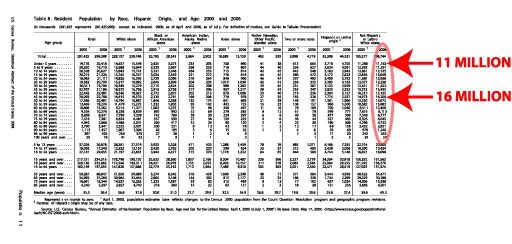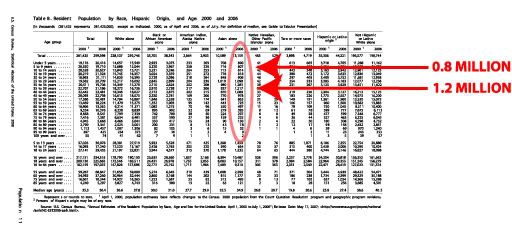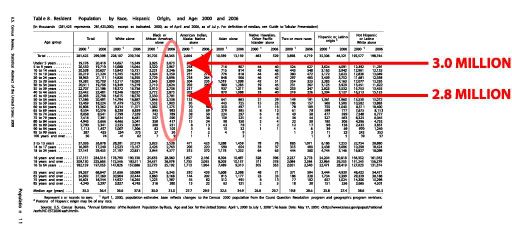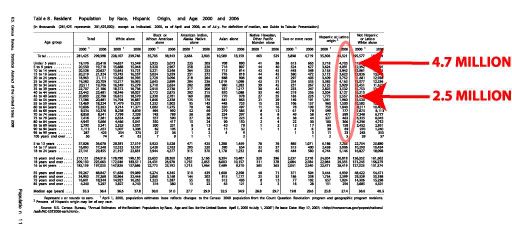Skip to comments.
Despite high school algebra focus, more students need remedial college math
Sacramento Bee ^
| May 12, 2008
| Deb Kollars
Posted on 05/13/2008 7:03:24 AM PDT by reaganaut1
Five years ago, California took a bold step and began requiring algebra of every graduating high school senior. The grumbling ran deep. The work was hard. The underlying equation came through loud and clear:
More math in high school would equal more students prepared for college.
For many, it hasn't added up.
In a pattern that has area math professors scratching their heads, some community colleges are seeing an increase in the numbers and proportions of entering students who can't do algebra, or even basic arithmetic.
At Sierra College in Rocklin, for example, of the 199 sections of math being taught this year, 68 of them – 34 percent – are arithmetic, pre-algebra or beginning algebra. Most students seeking a two-year or four-year degree must master those levels of math and in many cases go beyond.
Five years ago, the percentage of remedial math courses at Sierra was 28 percent.
Last year at Cosumnes River College in Elk Grove, 40.8 percent of incoming students who took a math placement exam tested into arithmetic or pre-algebra, up from 38.1 percent two years earlier. The proportion of courses in beginning algebra, pre-algebra and arithmetic at Cosumnes has marched steadily upward, from 43 percent in 2003 to almost 52 percent this year.
"It's the million-dollar question," said Mary Martin, math department chair at Cosumnes. "We are asking more of our high school students, so why isn't it transferring over to college?"
California high schools have responded to the monumental task of getting students through algebra, Martin and other math professors say, but the push is falling short.
It has educators concerned because algebra is considered a key subject for developing critical thinking skills. It provides the language and foundation for numerous fields, from nursing to the sciences to architecture.
(Excerpt) Read more at sacbee.com ...
TOPICS: Culture/Society; News/Current Events; US: California
KEYWORDS: education
Navigation: use the links below to view more comments.
first previous 1-20, 21-40, 41-60, 61-80 ... 101-104 next last
Comment #41 Removed by Moderator
To: avacado
Some people are better at mathematics. Some people are better at Language Arts or History. I took Algebra twice. I eventually had to settle for a summer school class of Pre-Algebra and a class of consumer math. I am not good at puzzles, either. So, maybe I am just stupid or I should never have graduated. I have old math books and every once in a while would try to learn it. A lady I know could never understand why that is one of my goals to learn Algebra. Yup. I homeschool my children, too. Good thing they are more like their father, so they can learn it more on their own.
To: reaganaut1
I’m taught a pre-calculus course last semester as an adjunct. Some of the students were college SENIORS and they couldn’t do 10th grade math. In order to pass some “students” I had to dumb the quizzes and tests down to a degree that they were essentially worthless. I practically told them what the questions would be beforehand and it didn’t help. Anything more than 15 questions for homework each week and there was a big issue. It wasn’t my fault that’s how the course is taught at that school and its how I was supposed to teach it. I feel lucky I only did it one semester, I would lose my mind if I had to do it over and over again. Some of those people did not belong in college let alone deserve to be given degrees in anything.
43
posted on
05/13/2008 7:42:01 AM PDT
by
Catphish
To: Lizavetta
I would much rather see, at least for non-math/science majors, a year of high school math spent on EVERYDAY MATH........learning about mortgage loans, credit card terms, buying a car, whether a high-ticket item is a good deal or not, compound interest and mutual funds, etc. etc. That's what this highly stupid person learned in Consumer Math. :-)
To: sandyeggo
I can relate to you, my husband is better in math than me. He does calculations in his head, but then he did well in engineering school, where one takes alot of math courses./Just Asking - seoul62.......
45
posted on
05/13/2008 7:45:18 AM PDT
by
seoul62
To: JoanneSD
What you describe - dividing 16 into the price per pound - is algebra. Figuring out the cost per ounce of a product is algebra.
When people talk about “we need to teach kids real life math skills, not algebra”, they are missing the point entirely. You need algebra/trigonometry skills in ordinary tasks like figuring out mortgage or investment terms, calculating how many square feet of carpet you’ll need to buy, or other basic tasks.
46
posted on
05/13/2008 7:46:18 AM PDT
by
JenB
To: SumProVita
..and if there is any problem, which could be something as basic as “I’m not happy,” then that is somebody else’s fault and the government’s responsibility to fix.
To: JenB
its not the concepts that are the problem, its the notation. That’s why she doesn’t think its algebra, because she’s not writing down an abstract equation.
To: reaganaut1
"We are asking more of our high school students, Question this. They might not be asking more.
49
posted on
05/13/2008 7:48:25 AM PDT
by
RightWhale
(You are reading this now)
To: babble-on
Right. It’s very frustrating to have people who can do algebra and do it all the time but think they can’t and that it’s not important.
50
posted on
05/13/2008 7:49:33 AM PDT
by
JenB
To: JenB
No, but anyone with a normal or even slightly lower than normal IQ is capable of algebra. An average IQ for the traditional American Caucasian population was, by definition, 100.
For Caucasians, a person with a "slightly lower than normal IQ" is in the 90's.
With the disclaimer that I am not an expert in the education of low-IQ children, I am very, very dubious that children with IQ's in the 90's can learn any algebra.
My best guess is that a child would need an IQ out in the 105-110 range in order to so much as attempt to tackle algebra, and, even then, it would be very, very rough going, with no guarantee of success.
Of course, our problem [really, our looming catastrophe, which will rip this nation apart at the seams, no later than about 2020] is that Blacks and Aboriginal/Mestizo Hispanics both have IQ bell curves whose AVERAGES are no higher than about 85 - i.e., on average, Blacks and Aboriginal/Mestizo Hispanics are what Caucasians would consider to be mildly retarded.
The reason this will tear the nation apart is because the American Caucasian [and Asian] numbers are in freefall, and the Blacks and Aboriginal/Mestizo Hispanics now provide almost half of all the children in the USA:
Of U.S. Children Under 5, Nearly Half Are Minorities
By D'Vera Cohn and Tara Bahrampour
Wednesday, May 10, 2006; Page A01
washingtonpost.com...Forty-five percent of U.S. children younger than 5 are minorities...
Statistical Abstract of the United States
Section 1, Population
[see especially Table 8 & Table 9, pages 11-13]
PDF FILE: pop.pdf
CAUCASIAN

ASIAN

BLACK

HISPANIC

51
posted on
05/13/2008 7:51:55 AM PDT
by
KayEyeDoubleDee
(const Tag &referenceToConstTag)
To: JenB
When people talk about “we need to teach kids real life math skills, not algebra” when people say the above, what they mean is that the course should be approached in practical terms. yes, the skills are algebra, but if it is taught as everyday life skills, students could actually see the applicability of math operations to their everday lives, instead of just a mess of formulae and equations. i am a lawyer but was premed my first year of college so i took a full year of calculus. if that has any application to my daily life i am unaware of it. my youngest is learning disabled and hates math with a passion. i don't blame her, but i do want her to see math as a part of her lifeskills and not textbook equations. that is all people really mean when they say teach math as real life math skills.
52
posted on
05/13/2008 7:53:58 AM PDT
by
xsmommy
To: avacado
LOL. Exactly. Before California took this “bold step”, just what, exactly, were the math requirements for high school? (shakes head)
53
posted on
05/13/2008 7:54:06 AM PDT
by
khnyny
(Hillary is the national equivalent of Tracy Flick)
To: samtheman
And don’t forget the poor little darling’s precious self esteem. The NEA is all about that because it is another excuse for not teaching.
54
posted on
05/13/2008 7:54:14 AM PDT
by
caver
(Yes, I did crawl out of a hole in the ground.)
To: HungarianGypsy
I agree with you that some people are better at algebra than others. But in my day, everyone took it and everyone had to pass it to move forward. Learning can be very tough and that is where personal satisfaction comes in through achieving the difficult.
55
posted on
05/13/2008 7:55:20 AM PDT
by
avacado
To: ClearCase_guy
“They just didn’t know any better, because no one ever taught them.”
They also know that there are no consequences to suffer.
56
posted on
05/13/2008 7:55:43 AM PDT
by
caver
(Yes, I did crawl out of a hole in the ground.)
To: caver
Did you notice that once they allowed calculators on the math portion of the SAT, math scores decreased nationwide and remedial college math courses became a crisis?
57
posted on
05/13/2008 7:57:28 AM PDT
by
ktime
To: camle
Some general reactions although I understand what you are saying. Dads used to teach these things, not schools. The world is changing and I don't like it.
1) how to change the oil in your car
EPA and greens discourages with rules and regulations. It is a hassle to get rid of the old oil. I have a brother on the farm who will use it in his shop stove.
2) How to change a flat tire
I can't remember the last time I had a flat, been 20 years. Use to have flats all the time when a kid. Better tires? better roads?
3) How to change spark plugs
Takes special tools these days (at least the last hard to get at plug).
4) How to wire a light switch/outlet/light fixture, etc.
Electrical code and unions discourage. Have to have a permit to do almost every thing now days if you want to be legit (which I usually am usually not).
5) How to sweat copper pipes
Plumbing code and unions and permits discourage. New product out there called pex which looks preferable to me.
6) Now to tie knots
Tie down straps and bungees are easier. I have rope in garage but haven't used in 10 years. Always admired Dads ability to work with rope and splice rope.
7) How to swim
Deep end of pools are gone because of liability
8) How to determine which way is North
Where do you use this now days? Most have gps.
One survival skill is being taught though - Rely on the gov’t, they will take care of you.
58
posted on
05/13/2008 7:57:41 AM PDT
by
PeterPrinciple
( Seeking the truth here folks.)
To: KayEyeDoubleDee
It does not take an IQ of 110 to “attempt” algebra. Basic algebra is certainly within reach of those with ~90 IQ. My youngest brother has mental retardation and an IQ of something probably around 80 and he could be taught basic algebra with some work (I’m talking about “find the unknown in the set of equations” algabra, not necessarily binomial theory)
59
posted on
05/13/2008 7:58:50 AM PDT
by
JenB
To: reaganaut1; Mark was here
community colleges are seeing an increase in the numbers and proportions of entering students who can't do algebra, or even basic arithmeticNot much point requiring algebra in high school, if mastery of arithmetic isn't required prior to entering high school. That's like teaching spelling to kids who haven't learned the alphabet yet.
Navigation: use the links below to view more comments.
first previous 1-20, 21-40, 41-60, 61-80 ... 101-104 next last
Disclaimer:
Opinions posted on Free Republic are those of the individual
posters and do not necessarily represent the opinion of Free Republic or its
management. All materials posted herein are protected by copyright law and the
exemption for fair use of copyrighted works.
FreeRepublic.com is powered by software copyright 2000-2008 John Robinson



